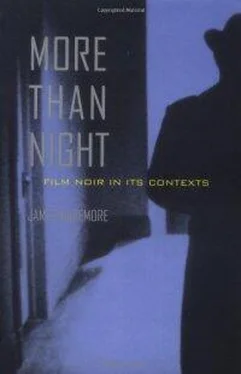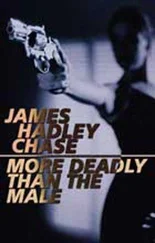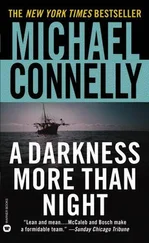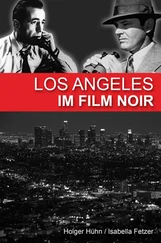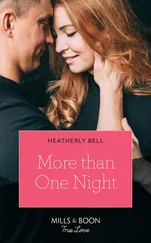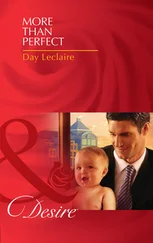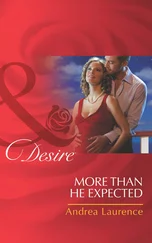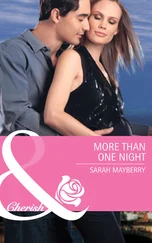The plot Chandler outlines in the original treatment is roughly similar to the one in the completed film, except that Buzz murders Johnny's wife and then suffers a blackout, completely forgetting the incident. Chandler clearly intended to write a Hitchcockian "wrong man" picture, involving an exchange of guilt between Johnny and Buzz; in other ways, however, he was attempting to make all the leading characters seem like scapegoats for a pervasive social malaise. At the end, the nightclub owner, Eddie Ansell (Eddie Harwood in the film), makes a false confession to the murder and allows himself to be shot by the policeall this in order to protect his estranged wife, Joyce, who has already made a false confession to protect Johnny. After Ansell's death, the police close the case, and there is a brief love scene between Johnny and Joyce. On the next day, we see Buzz and George in their apartment, where the sound of a loud radio next door begins to trouble Buzz. Johnny and Joyce arrive; she is wearing one of Ansell's trademark blue dahlias "as a sort of gesture," and as they talk, she picks at the blossom. Seeing this, Buzz grows increasingly distracted. Suddenly he breaks into a crazed monologue and lies down on the couch, rather like a patient under analysis. As his friends watch, he seems to hallucinate the murder scene, ultimately falling into an exhausted sleep. The treatment concludes with the grim reactions of his two wartime buddies:
They sit watching him. His eyes close and he begins to breathe deeply.
Johnny: (To George) Wellthat's it. I hope he never remembers it.
George: He wanted to get his own mother out here and make a home for her. He wanted a lot of things. Now he'll have to live in a room with a barred window.
Johnny: (Quietly) I hope he never remembers.
THE END 19
"What the Navy Department did to the story," Chandler told James Sandoe, "was a little thing like making me change the murderer and hence make a routine whodunit out of a fairly original idea" (quoted in Mac-Shane, Life of Raymond Chandler, 117). But the navy was not the only censor. The Breen Office was concerned because Chandler depicted Johnny, the character played by Alan Ladd, as a "double" for Buzzthat is, as a trained killer who, under stress, is prone to manic brutality. At one point in the final draft of the script, Chandler carefully describes a beating that Johnny administers to Corelli (Howard Freeman), the night manager of a sleazy Santa Monica hotel. Johnny puts a cigarette out on the back of Corelli's hand, punches him ''a staggering blow" in the windpipe, and then "swarms all over him" with a gun. A close-up shows Corelli's face as the gun strikes his nose and cheeks: "Blood spurts.
Corelli's eyes glaze. The gun smashes the side of his jaw. Corelli sinks down out of the shot. There is a thud as he hits the floor" (Chandler, Blue Dahlia: A Screenplay , 90). In a later scene, after being knocked out and taken to a deserted farmhouse, Johnny overpowers Leo (Don Costello), one of Harwood's criminal associates, who wears thick eyeglasses:
B-129 CLOSE SHOT JOHNNY
With his arm curved around Leo's neck . . . Johnny's hand comes up with the thumb extended. It goes toward Leo's eye.
B-130 EXTREME CLOSE UP JOHNNY'S FACE
Bending down over Leo. It is savage. The muscles of his face are tense as he j abs his thumb into Leo's eye, out of shot. Leo screams. Johnny lets go. There is a heavy thud as Leo falls. He groans.
Johnny reaches down for his handkerchief and wipes his hand. (iii)
Paramount toned down this action, and elsewhere it omitted several uses of brass knuckles and blackjacks. At the request of the Breen Office, it also cut a scene in which Johnny deliberately sideswipes a sheriff's car, and it dropped a line of dialogue that the PCA felt would be "resented by the police generally." The objectionable line involved Johnny's memories of his youth: "When I was a kid in Chicago, I saw a cop shoot a little white dog to death." In the completed film, the police are benign, and Johnny seems more conventionally middle class; indeed, Alan Ladd is so well groomed and dressed that he looks the economic equal of his rival, the dapper Eddie Harwood (Howard da Silva).
The loss of Buzz as the killer is even more significant, because it turns The Blue Dahlia into the sort of entertainment Chandler spent his entire literary career attacking: a classic detective story, bringing all the suspects together in a single room and dramatically revealing one of them as the guilty party. The revised concluding scenes also contain a spectacular moment reminiscent of a circus sideshow: Johnny holds a match in his hand and orders Buzz to light it by firing a gun. What Chandler had wanted to write, as he explained to Sandoe, was the story of a man who killed (executed would be a better word) his pal's wife under the stress of a great and legitimate anger, then blanked out and forgot all about it; then with perfect honesty did his best to help the pal get out of a jam, then found himself in a set of circumstances that brought about partial recall. The poor guy remembered enough to make it clear who the murderer was to others, but never realized it himself." (Quoted in Chandler, Blue Dahlia, 13233)


Alan Ladd and Will Wright in the revised ending of The Blue Dahlia (1946).
When Chandler was eventually forced to abandon this idea, the Breen Office, like the navy, was pleased. Hollywood movies were supposed to avoid ambiguities, providing a neat balance sheet of rewards and punishments. Thus in its May 1945 report, the PCA approved of the completed script for The Blue Dahlia, describing it as a "murder mystery" of no particular social import and noting that the (civilian) killer was captured and shot by the police. The reviewer also noted, "We have the feeling Joyce and Johnny will find happiness together someday."
The resulting film is nevertheless a better-than-average thriller, enhanced by Chandler's stylization of American speech, and redolent of his original themes. Even if Johnny and Buzz are innocent of murder, the war has turned them into potential killers, and life in Los Angeles makes them disoriented, angry, and paranoid. At the end of the picture, when the true culprit is revealed, his identity hardly seems to matter. As if to compensate for what the studio and the navy had done to his script, Chandler pins the crime on one of the most powerless people in the story"Dad" Newell, an elderly house detective at the posh Cavendish Court Hotel. Before he dies, Newell expresses his class resentment, and his parting speech gives a rare opportunity to the underrated character actor Will Wright, who makes the most of it: "Maybe I could get tired of being pushed around by copsand hotel managersand ritzy dames in bungalows. Maybe I could cost a little something onceeven if I do end up on a slab!"
In the last scene of the film, Detective Captain Henderson (Tom Powers) seems troubled about Newell. "I must be getting droopy," he says. "I felt kind of sorry for the old gent at that." In a similar fashion, Chandler enables us to feel sympathy for the film's other ostensible villain, Eddie Harwood, who, because of his criminal record, has been able to stay home during the war and acquire money and women. "I'm not much of a hot shot after all," Harwood says, and throughout the picture he seems trapped and joyless. Matthew J. Bruccoli has described him as an "elegant quasi-racketeer," troubled with guilt over his broken marriage, and continually aware of Johnny's "moral superiority'' (Chandler, Blue Dahlia: A Screenplay, 132). Leo, his sinister associate, warns him about the dangers of such an attitude: "Just don't get too complicated, Eddie."
Читать дальше
